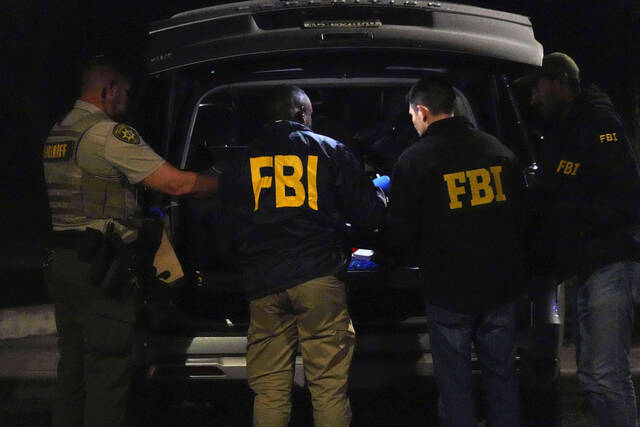The U.S. House voted Thursday afternoon to slash nearly $1.1 billion in federal funding to the Corporation for Public Broadcasting, which supports local NPR and PBS stations such as Pittsburgh’s WESA-FM radio and WQED-TV.
The Rescissions Act, which also would cancel $8.3 billion in foreign aid spending, passed the Republican-led House on a 214-212 vote. It now heads to the Senate for consideration.
“House Republicans are committed to right-sizing the government and it starts with commonsense reforms like these,” U.S. Rep. Mike Kelly, R-Butler, said in a statement.
“The American people have made it clear they want Congress to get federal spending back on track. This is just the first step toward getting Washington’s fiscal house in order,” Kelly added.
The bill would rescind $535 million in funding to the Corporation for Public Broadcasting over each of the next two years.
The bill’s sponsor, House Majority Leader Steve Scalise, R-La., said in a statement that the measure would eliminate federal funding for “wasteful foreign aid initiatives within the State Department and USAID, as well as woke broadcasting, including NPR and PBS, at the Corporation for Public Broadcasting, which is a business the federal government shouldn’t even be in.”
In defending the cuts, Kelly said NPR’s CEO, Katherine Maher, has described President Donald Trump as a “fascist” and “deranged racist.” In congressional testimony earlier this year, Maher said she regretted making those statements in social media posts made years before she took the helm of NPR.
In other examples of what Kelly described as waste, fraud and abuse of federal funding, the congressman cited PBS programming including two documentaries featuring the stories of transgender people and a $1.9 million grant that CPB said would “strengthen (NPR’s) editorial operations” to help it produce content that “consistently adheres to the highest standards of editorial integrity — accuracy, fairness, balance, objectivity and transparency, and the obligation to include diverse viewpoints.”
Kelly said the grant showed that NPR “recognized their complete leftist bias.”
U.S. Rep. Chris Deluzio, D-Fox Chapel, voted against the rescissions.
“He believes that American democracy depends on a free and independent press and that public media is an important part of America’s free exchange of ideas,” spokeswoman Zoe Bluffstone said.
U.S. Rep. Summer Lee, D-Swissvale, added: “After voting to cut Medicaid, SNAP and other essential services to give billionaires a tax break, House Republicans just voted to slash NPR, PBS and critical foreign aid. These dangerous cuts will impact (the 12th Congressional District) directly by defunding public broadcasting stations and refugee resettlement agencies. It’s why I voted no and will continue to oppose DOGE’s efforts to prioritize the wealthy over the working class.”
The office of U.S. Rep. Guy Reschenthaler, R-Peters, did not respond to a request for comment.
In a statement issued after Thursday’s vote, WQED President and CEO Jason Jedlinski said, “We are deeply disappointed, but not surprised. Our fight to protect public media does not end with today’s vote, and we will continue to make the case for our essential service in the days and weeks ahead.”
Likewise, Terry O’Reilly, president of WESA and WYEP-FM parent Pittsburgh Community Broadcasting Corp., said, “While we’re disappointed with the outcome of the vote, we recognize this is only the first step in the rescission process and that just because the House approved this bill by a very narrow margin, there’s no guarantee of smooth sailing through the Senate. Quite the opposite, I suspect.”
Jedlinski and O’Reilly both encouraged supporters to reach out to the offices of U.S. Sens. John Fetterman, D-Braddock, and Dave McCormick, R-Pittsburgh, in advance of a Senate vote.
“Meanwhile,” O’Reilly said, “we’ll continue to do the important work we’ve been doing for years: providing trustworthy journalism and locally curated music services that aren’t available anywhere else.”
Jedlinski said the $535 million doled out annually to the CPB, amounting to $1.60 per taxpayer, helps “offset the significant cost of producing original children’s programming, plus educational series like “Nature” and “NOVA,” which WQED licenses from PBS.
He added that more than 1,500 local and independent stations rely on pooling resources from CPB for things like fiber and satellite connections and music licenses.
“The whole network would be severely disrupted” if that funding disappeared, he said.
Jedlinski previously told TribLive that the CPB funding accounts for about 11% of WQED’s revenue, while O’Reilly has said the CPB funding provides nearly 5% of the Pittsburgh Community Broadcasting Corp.’s budgeted revenue.
Other rescissions in the House bill include clawing back about $900 million from the $10 billion that Congress approved for global health programs, including ones addressing infectious diseases, child and maternal health and the global HIV epidemic.
The Trump administration is also looking to cancel $800 million, or a quarter of the amount Congress previously approved, for a program that provides emergency shelter, water and sanitation, and family reunification for those forced to flee their own country.
Other rescissions would target programs designed to boost the economies, democratic institutions and civil societies in developing countries.
The Associated Press contributed.








